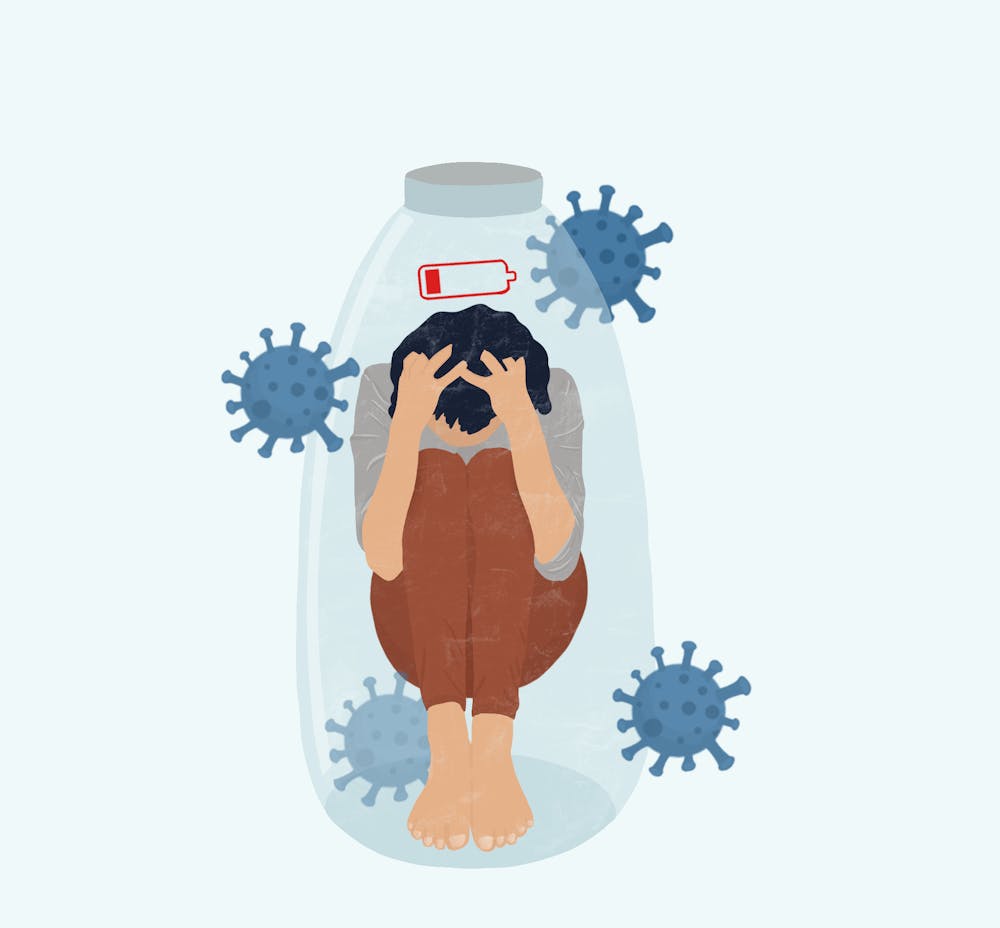Lea en español // 中文版请点击此处
The anniversary of the declaration of COVID-19 as a global pandemic was a significant milestone for many, as normal life has been out of sight and mind for most Americans for over a year now. The 13-month toll that the pandemic has taken on the University community has resulted in the phenomenon of pandemic fatigue for many individuals — defined as the general “demotivation to follow recommended protective behaviors” by the World Health Organization. Beyond just demotivation, students have experienced significant changes to overall mental health and wellness due to added stress and the disruption of normalcy.
Acknowledging pandemic fatigue calls for reflection on coping mechanisms and cautious optimism going forward as communities are vaccinated and approach herd immunity.
Nicole Ruzek, director of Counseling and Psychological Services, sums up the idea of pandemic fatigue as being “a chronically stressful situation for over a year now that has been testing our patience.”
Considering the end of the pandemic is not yet in clear sight, it is easy to feel tired and frustrated, Ruzek said, which can cause the nervous system to operate in occasionally unhealthy ways.
The symptoms of pandemic fatigue range broadly from person to person, but frequently, Ruzek mentions that many people feel “restless, anxious or angry … demotivated, sad and depressed.”
Krysten Kuhn, a second-year College student, shared how these feelings impact her own experience.
“It’s definitely kicked up the anxiety response for a lot of people,” Kuhn said.
Kuhn notes that she feels more anxious about a lot of daily tasks in general as a result of living under the constant stress of the pandemic.
Some unhealthy behaviors, or “negative coping,” that Ruzek notes are common involve behaviors like substance abuse, overeating, excessive sleep or a disregard for normal protective health measures.
Like many students, Kuhn notes that it’s easy to fall into a mindset of ignoring the virus. But in her experience, the main deterrent to avoid making rash or unsafe decisions is actually her own anxiety over getting herself or others sick.
“It’s really easy to slip back into thinking, ‘I just want to do normal things again, forget COVID,” Kuhn said. “I couldn’t slip to the ‘I don’t care’ point because I care and worry about my health and the health of others so much.”
Melanie Brede, a nutritionist at U.Va. student health, notes that unhealthy habits relating to pandemic fatigue can manifest in one’s eating routines. For those experiencing eating disorders or other mental health challenges that may affect diet, the pandemic has been particularly challenging.
“Recognize that trying to manage stress through eating is an attempt at self-care, and that is a good thing,” Brede said.
If these eating habits do result in or exacerbate unhealthy consequences, though, Brede suggests turning to other ways of managing stress. U.Va.’s well-being guide can be a first step for students seeking a change to unhealthy coping mechanisms. Additionally, CAPS has compiled a list of resources pertaining mostly to mental health. Student-led initiatives such as U.Va. Mutual Aid can help alleviate factors like a lack of resources which might contribute to pandemic-related stress.
Thankfully, Ruzek notes, humans are susceptible to and often resist change, which means they “are extremely good at adapting to change and learning from the challenges it brings.” At this one-year anniversary, reflection on healthy coping mechanisms and hope for the future will help the community move forward to the finish line of the pandemic.
Ruzek emphasizes the importance of building resilience. Some suggestions she gives for building physical resilience in daily routines are through exercise, good eating habits and optimal sleep. Mental resilience can be built through healthy practices like journaling as a way to self-reflect or talking to trusted family members or friends to navigate through challenging days. Introspective attention to self-talk is also critical to shaping emotional resilience.
“Is [your inner voice] kind, forgiving and encouraging, or is it judgmental, guilt-ridden and pessimistic?” Ruzek said.
Adopting a more positive self-talk routine can be critical to improving attitudes towards the pandemic.
Taking advantage of the warmer spring weather and meeting up with friends in a socially-distant manner can also help students to break out of the indoor bubble in which most daily life is currently spent. Being outdoors ensures ample space for distancing and following other COVID-19 guidelines while allowing for social interaction with individuals who may not otherwise be seen in daily routines.
“It is important to remain optimistic while also adhering to the necessary guidelines that have allowed us to get this far,” Ruzek said.
Increasing safe, outdoor meetups with friends can act as a method of raising optimism without breaking COVID-19 protocol. With expanded gathering limits recently announced by the University, students can safely gather outside with up to 25 friends masked, which has led to more students gathering, especially with the improving spring weather.
Kuhn mentions the importance of getting outdoors as one of her main coping mechanisms.
“You have to work with what you’ve got,” Kuhn said. “Getting out of the apartment has been really important, [even if] it’s just a 10 minute walk around the corner.”
Should vaccine rollout continue as planned, hopefully some semblance of normalcy will return later this year. The Blue Ridge Health District — which includes Albemarle County and Charlottesville — just expanded vaccine access to phase 1c, which includes an additional 7,000 people in the health district. Additionally, all Virginians aged 16 and up will be made eligible for the vaccine April 18, Governor Ralph Northam announced April 1.







